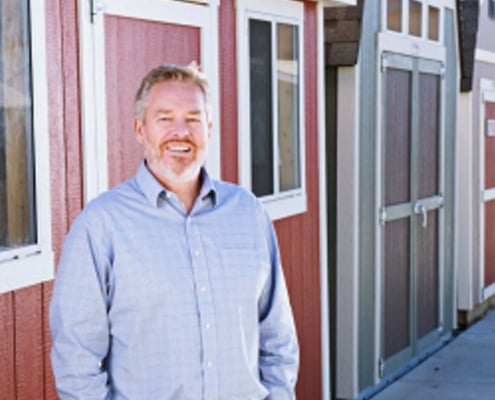Denver
Founded: 1981 (in Rexburg, Idaho); moved to Denver in 1986
Privately owned
CEO Tom Saurey is guiding his shed manufacturer to national dominance and eying the recreational market with prefabricated cabins.
Saurey started the company out of his garage in Rexburg, Idaho, and now Tuff Shed is the biggest shed company in the country.
The company has built 770,000 structures in the last 33 years and now has 42 manufacturing facilities in 31 states. With a distribution network that includes more than 1,000 Home Depot stores, annual revenues are approaching $200 million, and growth has been in the double digits for four years running.
Over the years, Tuff Shed has lived up to its name — striving to make a sturdier shed, especially where it counts. To wit, the company has patents on the eaves, the doors, and other components.
The door is the most important part of a shed. “Unless you put a window on these buildings, the only moving part is the door,” says VP of Marketing Phil Worth. Over time, a basic wood-framed door tends to succumb to the elements. “They warp, they fall out of true, they won’t close properly.”
But Tuff Shed doors are reinforced with steel. “It’s so heavy that we has to design a hinge that was heavier-duty,” says Worth. “It’s absolutely the envy of the market.”
“We get geeked out our products,” he adds. “There’s a sound our door makes when you slam it that says, ‘That’s heavy-duty and closed tight.'”
Saurey says that 95 percent of Tuff Sheds go into residential backyards, and the sheer size of the products makes for the decentralized network of 42 factories. Notes Saurey: “The biggest thing is logistics.”
As Tuff Shed installs its products, every local facility has a licensed contractor to deal with local permitting and zoning issues.
Tuff Shed doesn’t make sheds and sheds alone. The catalog also includes garages, chicken coops, and other structures. The company moved into cabin shells and other recreational structures with the 2004 acquisition of Texas-based Wood Master. After a decade, Tuff Shed has refined the concept and rolled it out nationally this year.
Tuff Shed has also moved into sheds designed for bike storage. “We’re a consumer society,” says Worth. “Especially if you’re an active American, you accumulate gear.”
But the bread and butter of the market remains a tough backyard shed. Notes Saurey: “Our customer base is the best customer base there is. They’re a homeowner and they care about their home. They can put one of our sheds in their backyard and it’ll stay with them as long as they’re there.”
Challenges: The neverending booms and busts of the economy. “The recession slowed us down,” says Saurey, attributing recent growth to “pent-up demand” and strong sales and marketing.
Opportunities: Expanding into the last 19 states on the map, primarily east of the Mississippi River. “My original dream was to go nationwide,” says Saurey.
Tuff Shed’s expansion in the recreational market represents a move into larger structures. Weekenders start at about 100 square feet for $4,000 and the most deluxe cabin shells top out at about 2,000 square feet and $50,000.
“We’re going to keep doing what we’re doing on the storage side, but also step into the market for bigger structures,” says Saurey.
Needs: A reliable supply chain. “Sometimes, there’s a shortage of raw materials,” says Saurey. “A lot of raw materials are going to China.”
Adds Worth: “It’s hard to make a superior product with inferior raw materials.”






